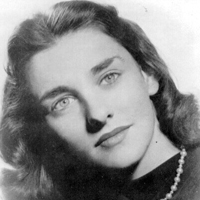Anne Sexton - Biography and Works
Anne Sexton is a twentieth century American poet known for the frank treatment of intimate and taboo subjects. Born in Newton, Massachusetts, Sexton attended Garland Junior in Boston, Massachusetts, from 1947 until 1948, when she married. In 1959 she suffered a suicidal breakdown after the birth of her second child. During the course of psychiatric treatment, Sexton wrote poetry, an effort she had tried in school.

Anne Sexton (1928-1974)
In 1957 she joined a poetry workshop in Boston, which brought her into contact with American poets Robert Lowell and Sylvia Plath, both of whom became influences. Sexton’s poetry soon developed a confessional style, in which she used images of incest, adultery, and madness to reveal the depths of her deeply troubled life. In most of her “confessional” poems, the speaker is the poet herself, laying bare the intimate traumas of her life and her times; she viewed the act of writing as an affirmation of life or, at least, a rebellion against the forces that threatened to overwhelm her.
Her first book of poetry To Bedlam and Part Way Back (1960) was an account of her mental breakdown. Sexton’s other early books of poetry include All My Pretty Ones (1962) and Live or Die (1966; Pulitzer Prize, 1967). Sexton taught at Boston University from 1970 to 1971 and at Colgate University from 1971 to 1972. Sexton became addicted to sleeping pills and alcohol, and by the early 1970s her poetry was engaged in a continuing discussion of death and suicide. Her books from this period, include The Death Notebooks (1974) and The Awful Rowing, Toward God (posthumously published 1975). In 1974 Sexton committed suicide.
Anne Sexton was a confessional poet. That is, she wrote poetry out of the most intimate and painful experience of her life. To a certain extent every poet does this, but few have done so with the frankness and audacity of this one. Sexton presented the truth about herself, her experiences, and her psychic life in the starkest possible terms. She was strongly influenced by other confessional poets, including Robert Lowell and, in particular, W.D. Snodgrass; her friend Sylvia Plath, Maxine Kumin, and George Starbuck also played a part in her poetic development.
Sexton’s subject matter was often related to her mental therapy, for she was continuously under the care of a psychiatrist and was several times treated in mental institutions. Hence her poems – which in fact began as therapy – are often attempts to deal with the guilt, fear, and anxiety that were the legacy of her childhood. If the poems sometimes seem like one long psychiatric case history, they nevertheless document in a remarkable fashion the growth of a gifted and tortured sensibility. And readers undaunted by the intimacy and intensity in poetry will find in Sexton’s work an extraordinary aesthetic experience. Much of the aesthetic experience that Anne Sexton’s poetry generates relates to the lady poet’s attempts to sort out the tangled emotion left at the death of her near and dear ones.
Cite this Page!
Sharma, Kedar N. "Anne Sexton - Biography and Works" BachelorandMaster, 1 Nov. 2013, bachelorandmaster.com/biography/anne-sexton.html.
Related Topics
The Truth the Dead Know: Summary and Analysis
Confessional Poetry: A Genre of Poetry
 |
bachelorandmaster.com |